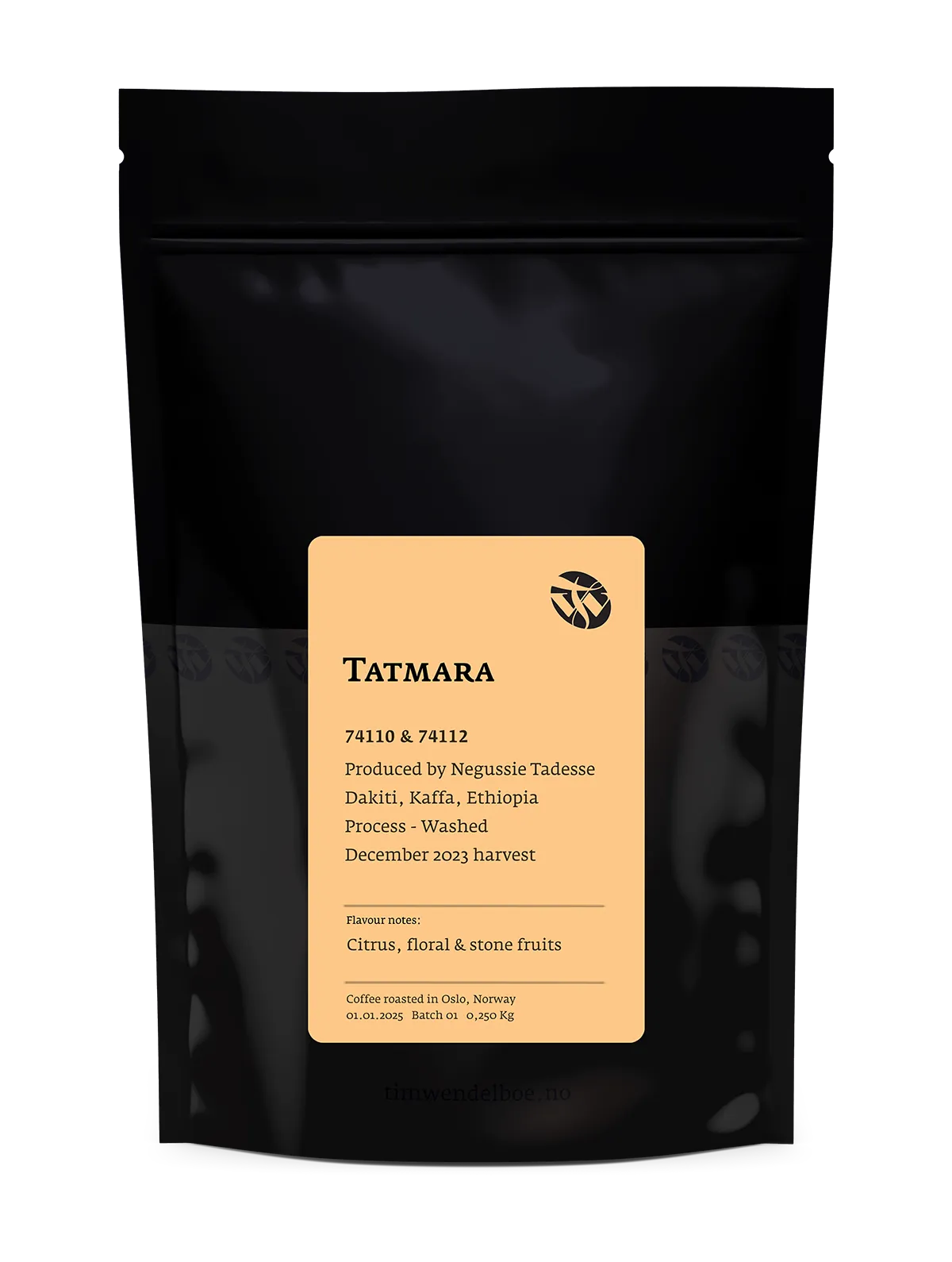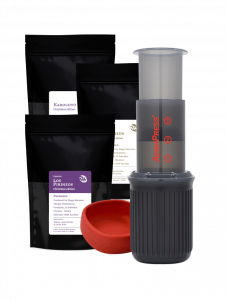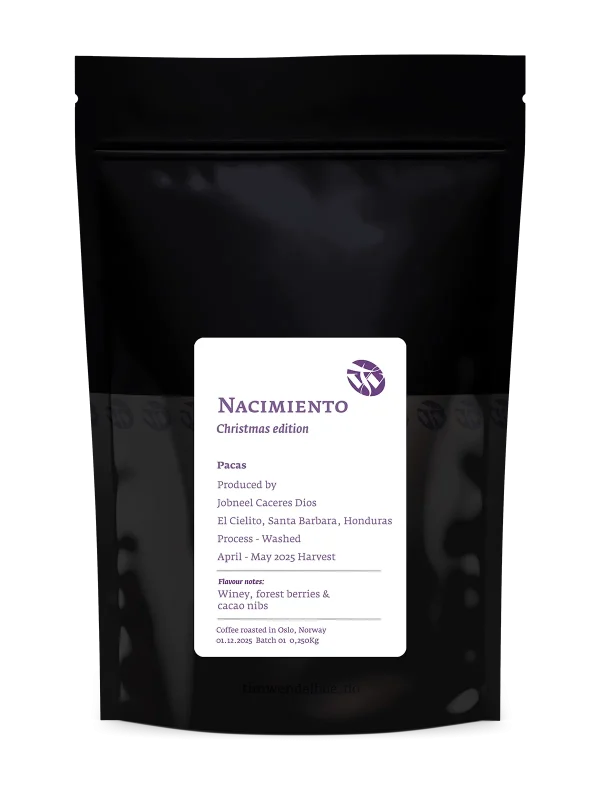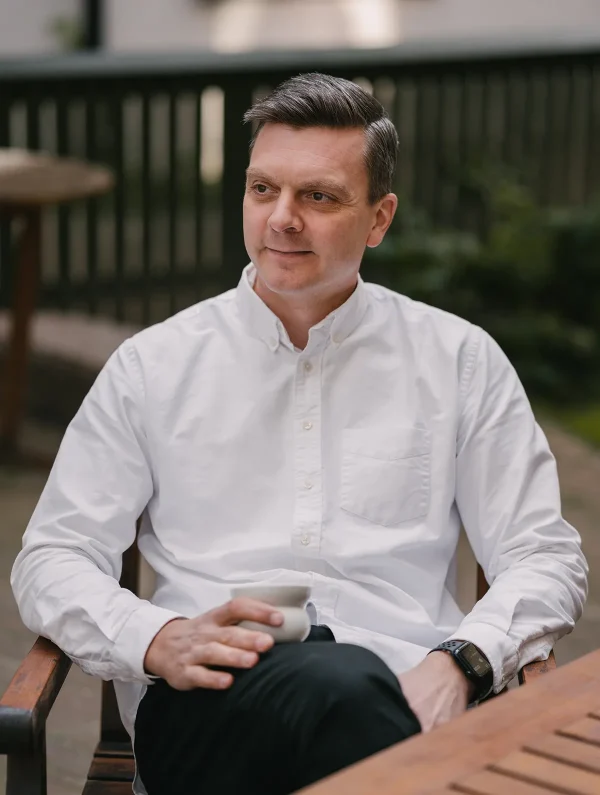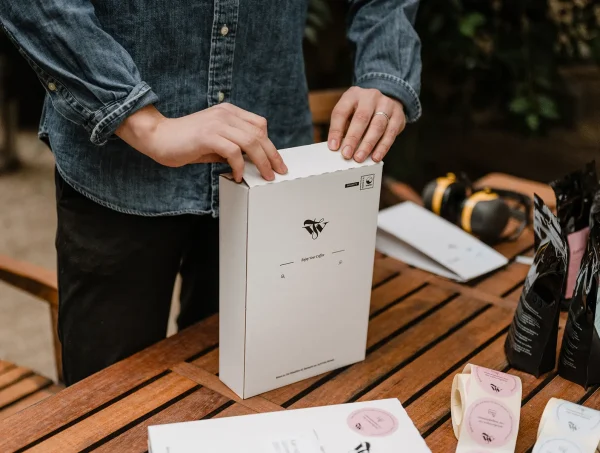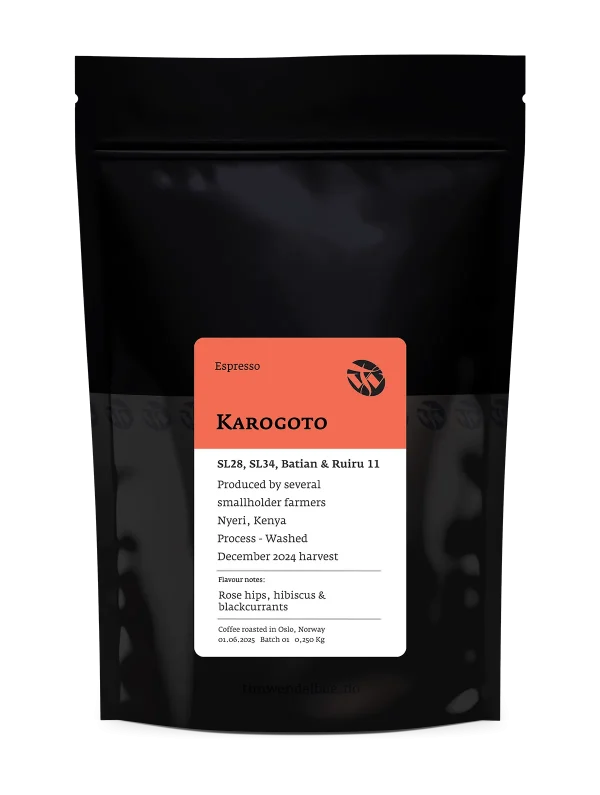| Cultivar | 74110 & 74112 |
|---|---|
| Flavour Notes | Floral, stone fruit & citrus |
| Producer | Negussie Tadesse |
| Country | Ethiopia |
| Region | Dakiti, Kaffa |
| Process | Washed |
| Harvest | December 2023 |
| Roast Profile | Light Roast |
| Contents | Whole Coffee Beans |
| Bag Size | 250g |
Tatmara
kr215.00
The first washed coffees from one of the most beautiful farms we know. A clean and expressive coffee with floral, citrus and stone fruit flavours.
Out of stock
Additional information
Tim's Notes
In 2022 we held a fund raiser during our 15 year anniversary and collected money that we donated to Negussie in order to fund the construction of a new wet mill on his farm. The wet mill was completed in October last year and I was able to be there to oversee the first lot being processed at the new mill. It was very beneficial to be able to be there right at the start of the harvest. It meant that we could see the mill in use and uncover any risks and make a protocol on how we would like our coffees to be processed.
Like with the coffees we buy from Echemo, we asked Negussie to separate all daily pickings, to dry the coffees under shade nets and to store the coffees in air tight grain pro bags after drying, making sure every daily picking was properly marked. We also agreed upon the processing protocol, ensuring good results by controlling fermentation and implementing soaking of the coffee after the mucilage was removed mechanically. As soon as the coffees were dried, samples were sent to us in Oslo in order to be able to give feedback and evaluate the quality. The harvest went really well much thanks to the help and follow up done by Fantanesh Keleme and the whole team at Belco in Ethiopia, who made sure Negussie was properly trained and followed the protocols for all the coffees he produced for us. In fact none of the washed coffees were rejected as all of them ended up tasting really good.
My only regret is that we only asked for 20 bags (60kg) of the washed coffees as they turned out to taste fantastic. But we did not want to take too much risk given that this was Negussie’s first time preparing washed coffees on his farm. That also means we were not able to send it out to all our subscribers as the volumes just was not big enough. We aim to get more of this coffee in the coming years as it is very expressive with loads of jasmine, floral, bergamot, citrus and stone fruit flavours.
A huge thanks to all our supporters for making this project a reality. We really hope you will enjoy this coffee.
Like with the coffees we buy from Echemo, we asked Negussie to separate all daily pickings, to dry the coffees under shade nets and to store the coffees in air tight grain pro bags after drying, making sure every daily picking was properly marked. We also agreed upon the processing protocol, ensuring good results by controlling fermentation and implementing soaking of the coffee after the mucilage was removed mechanically. As soon as the coffees were dried, samples were sent to us in Oslo in order to be able to give feedback and evaluate the quality. The harvest went really well much thanks to the help and follow up done by Fantanesh Keleme and the whole team at Belco in Ethiopia, who made sure Negussie was properly trained and followed the protocols for all the coffees he produced for us. In fact none of the washed coffees were rejected as all of them ended up tasting really good.
My only regret is that we only asked for 20 bags (60kg) of the washed coffees as they turned out to taste fantastic. But we did not want to take too much risk given that this was Negussie’s first time preparing washed coffees on his farm. That also means we were not able to send it out to all our subscribers as the volumes just was not big enough. We aim to get more of this coffee in the coming years as it is very expressive with loads of jasmine, floral, bergamot, citrus and stone fruit flavours.
A huge thanks to all our supporters for making this project a reality. We really hope you will enjoy this coffee.
Cultivar
Negussie has mainly planted two different cultivars named 74110 and 74112 on his farm that he separates when picking and processing his coffees. Both cultivars are selections made by the Jimma Agricultural Research Center (JARC) and although they have very similar qualities, there are some subtle nuances in the flavour profile. The two cultivars begin with the number “74” that indicates their cataloging and selection in 1974.
The 74110 cultivar was selected from an original “mother tree” in the Bishari village of the Metu Province in the Illuababora zone. After research in their field laboratory (coffee farm) in Jimma, the JARC researchers found the cultivar to be resistant to coffee berry disease and to have a high yield potential. JARC released the cultivar in 1979 as a new and improved cultivar and since then it has become one of the most popular cultivars in Ethiopia known for its floral and citric flavour profile.
Cultivar 74112 also originates in the Metu-Bishari forest and was similarly released in 1979 for its resistance to coffee berry disease and high yield potential. Like the 74110 it is also among the most commonly planted cultivar in Ethiopia today, especially on recently established farms in the southern, southwestern and western coffee-growing parts of Ethiopia.
(Source: "A Reference Guide to Ethiopian Coffee Varieties" by Getu Bekele and Timothy Hill. G Broad Trading PLC, Addis Ababa, Ethiopia / Counter Culture Coffee, Durham, NC, USA, 2018.)
The 74110 cultivar was selected from an original “mother tree” in the Bishari village of the Metu Province in the Illuababora zone. After research in their field laboratory (coffee farm) in Jimma, the JARC researchers found the cultivar to be resistant to coffee berry disease and to have a high yield potential. JARC released the cultivar in 1979 as a new and improved cultivar and since then it has become one of the most popular cultivars in Ethiopia known for its floral and citric flavour profile.
Cultivar 74112 also originates in the Metu-Bishari forest and was similarly released in 1979 for its resistance to coffee berry disease and high yield potential. Like the 74110 it is also among the most commonly planted cultivar in Ethiopia today, especially on recently established farms in the southern, southwestern and western coffee-growing parts of Ethiopia.
(Source: "A Reference Guide to Ethiopian Coffee Varieties" by Getu Bekele and Timothy Hill. G Broad Trading PLC, Addis Ababa, Ethiopia / Counter Culture Coffee, Durham, NC, USA, 2018.)
Process
Picking
- Ripe coffee cherries are hand picked by local pickers and delivered to the farm in the afternoon. All pickings are separated by daily lots and by cultivars.
- Hand sorted ripe coffee cherries are kept in nylon bags (not air tight) over night. This starts the fermentation process ever so slightly and intensifies the flavour in the final product.
- The cherries are de-pulped the next morning and most of the mucilage is removed mechanically by a mechanical de-mucilage machine.
- The parchment coffee, still with a small amount of mucilage left on, is dry-fermented in a covered cement tank for 24 hours.
-
- The next morning the mucilage is washed off the parchment coffee.
-
- The wet parchment is placed on raised beds covered with shade nets. Defect coffee beans / parchment is hand sorted and removed from the good coffee.
- After a few hours of skin drying and the parchment is starting to get dry, the shade nets are removed. Then the parchment coffee is dried on raised beds until it has reached the desired moisture content of 9-11% which normally takes 10-14 days.
- The coffee is continuously stirred to ensure even drying and defects are sorted out by hand.
-
- After drying, the coffees are stored in air tight grain pro bags. Each daily picking is stored in separate bags until its final moisture and quality is checked and verified.
- Lots with acceptable moisture content and quality are then delivered to the dry mill in Addis Ababa where the coffee gets cleaned and sorted before packaging for export.
- The coffee is vacuum packed in sealed plastic bags before it is exported.
Shipping
For our Norwegian customers, we offer three shipping options:
- Pakke i Postkassen - With Pakke i Postkassen, tracking is provided, and delivery is estimated within 2-3 business days.
- Pakke til hentested - The parcel can be collected from a Post in Store, Post Office, parcel locker, or parcel box. This option includes tracking, with delivery expected within 1-5 business days.
- Norwegian Post, No Tracking (Brevpost) - This option does not offer tracking. Delivery is estimated within 2-5 business days.
How To Brew
Filter
- We strongly recommend using the correct measurements and brewing techniques when you brew our coffees. Use a digital scale both to measure water and coffee in order to get consistent results, and we recommend using between 60 to 70 grams of coffee per litre (1000g) of water, depending on the brewing method, water quality and coffee used.
- We strongly recommend using VST filter baskets. Both the 18g, 20g and the 22g basket is great for our coffee. The VST filters makes it a lot easier to extract the espresso properly which gives a lot more sweetness in the cup. They are also more or less identical to each other which makes it easy to be more consistent when brewing on several groups at the same time. You can buy the filters on our webshop, just make sure they fit your machine (ours fits all La Marzocco machines and machines with 58mm filter baskets). With the VST 18g filter basket, we recommend the following brewing parameters: 18-19g freshly-ground coffee, 25-35s brewing time, 35-38g of final brew liquid in the cup, 93°C-94°C brew water temperature.
Tatmara
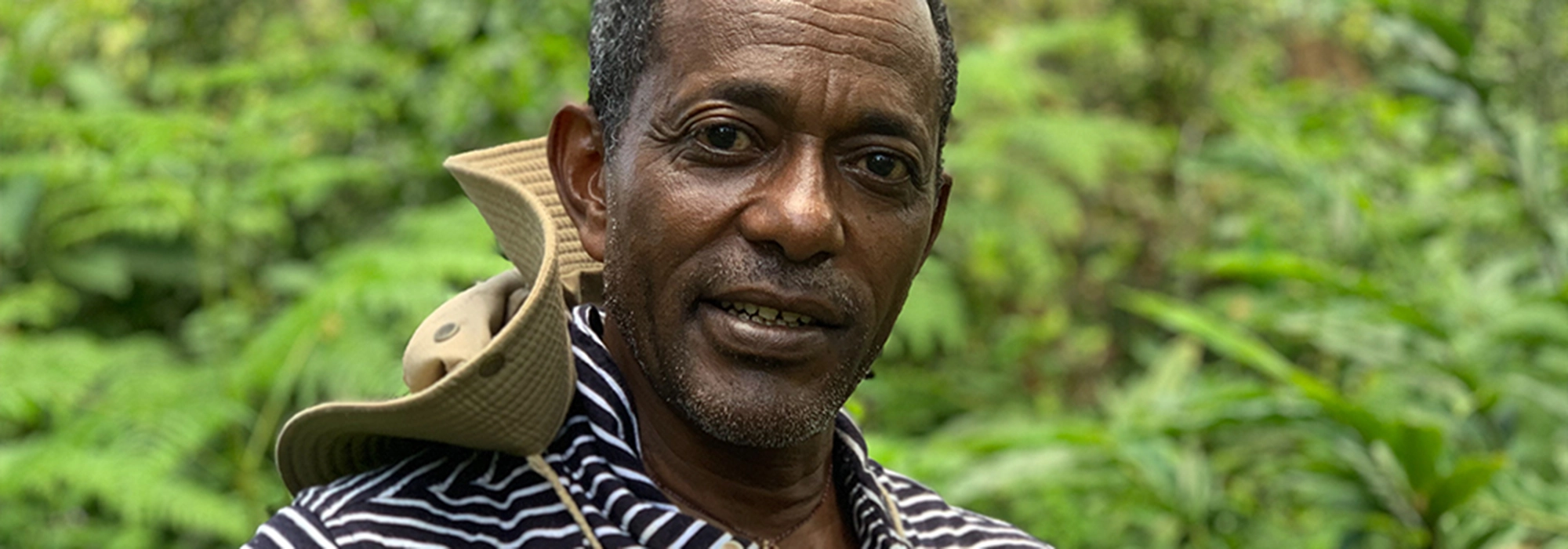
The Tatmara Coffee Plantation is situated near Bonga, the capital city of Kaffa in Ethiopia and owned by Negussie Tadesse. A few yers ago Ethiopia opened up for smaller farmers to sell coffee directly to roasters. When that happened, I immediately contacted the French import company Belco to see if they could help me get in touch with some farmers I could possibly start working with and buy coffee from. After a week of traveling in the areas of Jimma and Kaffa there were a few farms that stood out for me and one of them was the Tatmara Coffee Plantation and the farmer Negussie Tadesse.
Negussie was already separating his coffees by cultivars but was only producing natural processed coffees due to not having infrastructure to wash coffees yet. He had a very open mind and wanted to work with quality so I decided to at least get started by buying some natural processed coffees.
In 2022 we held a fund raiser during our 15 year anniversary and collected money that we donated to Negussie in order to fund the construction of a new wet mill on his farm. The wet mill was completed in October 2023 and we have since then been able to buy delicious washed coffees in addition to the natural processed coffees from Negussie.
Learn More About Tatmara
Transparency
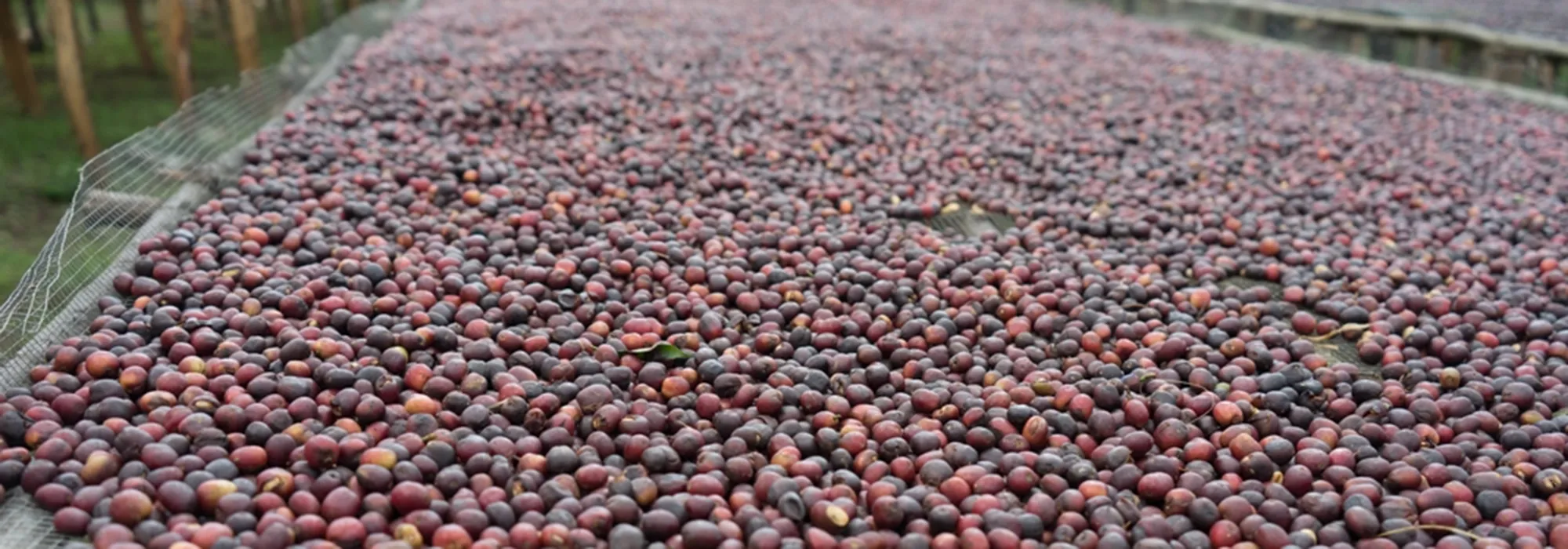
We met Negussie through the French import company Belco and have visited his farm several times since then together with the Belco team. It is our third year buying coffee from Negussie and although it has been challenging we have had great support from Belco who have been assisting both Negussie with knowledge and quality control as well as helping us with logistics, milling and communication. We are currently paying USD 5,00 per lb F.O.B. for the green coffee to Negussie and milling and transportation inside Ethiopia was paid by him as he is a coffee exporter. Belco added their margin to cover their expenses for helping us move the coffees and communicating and organising logistics with Negussie and assisting him during harvest.
Learn More About Transparency

